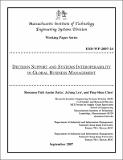| dc.contributor.author | Datta, Shoumen Palit Austin | |
| dc.contributor.author | Lyu, JrJung | |
| dc.contributor.author | Chen, Ping-Shun | |
| dc.date.accessioned | 2016-06-03T12:54:39Z | |
| dc.date.available | 2016-06-03T12:54:39Z | |
| dc.date.issued | 2007-09 | |
| dc.identifier.uri | http://hdl.handle.net/1721.1/102901 | |
| dc.description.abstract | Globalization of business and volatility of financial markets has catapulted ‘cycle-time’ as a key indicator of operational efficiency in business processes. Systems automation holds the promise to augment the ability of business and healthcare networks to rapidly adapt to changes or respond, with minimal human intervention, under ideal conditions. Currently, system of systems (SOS) or organization of networks contribute minimally in making decisions because collaboration remains elusive due the challenges of complexity. Convergence and maturity of research offers the potential for a paradigm shift in interoperability. This paper explores some of these trends and related technologies. Irrespective of the characteristics of information systems, the development of various industry-contributed ontologies for knowledge and decision layers, may spur self-organizing SOS to increase the ability to sense and respond. Profitability from pervasive use of ontological frameworks and agent-based modeling may depend on the ability to use them through better enterprise and extraprise exchange. | en_US |
| dc.language.iso | en_US | en_US |
| dc.publisher | Massachusetts Institute of Technology. Engineering Systems Division | en_US |
| dc.relation.ispartofseries | ESD Working Papers;ESD-WP-2007-24 | |
| dc.title | Decision Support and Systems Interoperability in Global Business Management | en_US |
| dc.type | Working Paper | en_US |
